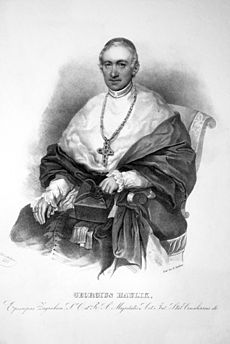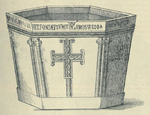Juraj Haulik
His Eminence Juraj Haulík Váralyai | |
|---|---|
| Cardinal. Archbishop of Zagreb | |
 | |
| Church | Roman Catholic |
| Archdiocese | Zagreb |
| Appointed | 11 December 1852 |
| In office | 1852–1869 |
| Predecessor | Aleksandar Alagović |
| Successor | Josip Mihalović |
| Other post(s) | Cardinal-Priest of Santi Quirico e Giulitta |
| Orders | |
| Ordination | 18 April 1811 |
| Consecration | 10 December 1837 by Lodovico Altieri |
| Created cardinal | 16 June 1856 by Pius IX |
| Rank | Cardinal-Priest |
| Personal details | |
| Born | 20 April 1788 |
| Died | 11 May 1869 (aged 81) Zagreb, Kingdom of Croatia-Slavonia, Austria-Hungary |
| Nationality | Slovak |
| Coat of arms |  |
| Part of a series on the |
| Catholic Church in Croatia |
|---|
 |
Juraj Haulik de Váralya (Slovak: Juraj Haulík Váralyai, Hungarian: Haulík Váralyai György; 20 April 1788 – 11 May 1869)[1] was a Croatian cardinal in the Roman Catholic Church of Slovak ethnicity and the first archbishop of Zagreb. He was also acting ban of Croatia for two separate terms.
Life
[edit]
He studied theology and philosophy in Trnava, Esztergom and Vienna.[2] After the death of bishop Aleksandar Alagović in 1837, Haulik was proclaimed bishop.[2][3] In 1840 he began his first term as acting ban of Croatia after the death of ban Franjo Vlašić.[4] He is credited for introducing the Croatian language into schools and workplaces, as well as forming the Matica hrvatska in 1842.[2] He helped the organization of Maksimir park in Zagreb.[2]
He was succeeded as ban by the Hungarian Franz Haller. Haller was brought in to carry on Magyarization in Croatia, which included the banning of the then Croatian banner name: Illyrians. A protest by the Croatian People's Party in 1845 was put out violently by Haller, leaving thirteen protestors dead, and ending his time as ban.[citation needed] Haulik was again called upon to take up the post.
During this term, the Croatian language was made official in the Kingdom of Croatia-Slavonia in 1847. In 1848, in the midst of revolutions in the Austro-Hungarian Empire, military man Josip Jelačić was proclaimed ban, terminating union with Hungary and advocating for Croatian autonomy.[5]
Some further autonomy did materialize for Croatia in the following years, as Haulik was proclaimed the first archbishop and metropolitan of Zagreb in 1852.[1] With this, the Catholic Church in Croatia became independent from Hungary. In 1856 he was also named Cardinal.[2] He carried on in these posts until his death in 1869.
While he was an ethnic Slovak, he said of his background: I was born a Slovak, but I will die a Croat.[6] In 1999, Croatia and Slovakia put out a joint-issue stamp featuring Haulik.[7]
References
[edit]- ^ a b "Rođen Juraj Haulik". vijesti.hrt.hr. Croatian Radiotelevision. 20 April 2015. Retrieved 8 February 2017.
- ^ a b c d e "Haulik, Juraj de Várallya". enciklopedija.hr.
- ^ Tomorad, Mladen (2019). Egypt in Croatia: Croatian Fascination with Ancient Egypt from Antiquity to Modern Times. Archaeopress Publishing Ltd. pp. 249–250. ISBN 9781789693409.
- ^ Lipovac, Marijan (9 September 2019). "Juraj Haulik, Prvi Zagrebački nadbiskup i kardinal". nacionalnemanjine.hr.
- ^ Velikonja, Mitja (2003). Religious Separation and Political Intolerance in Bosnia-Herzegovina. Texas A&M University. p. 113. ISBN 9781603447249.
- ^ "Juraj Haulik - borac za hrvatska prava i jezik". Vjesnik (in Croatian). 15 June 1999. Archived from the original on 21 September 1999.
- ^ "Cardinal Juraj Haulik - Archbishop of Zagreb". Croatian Post. Archived from the original on 6 March 2014. Retrieved 5 January 2013.

